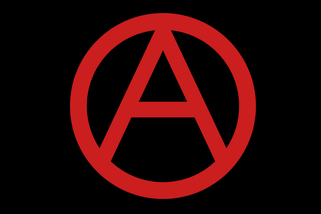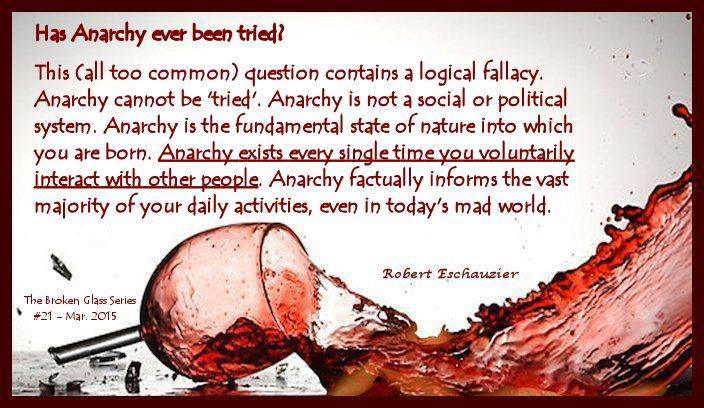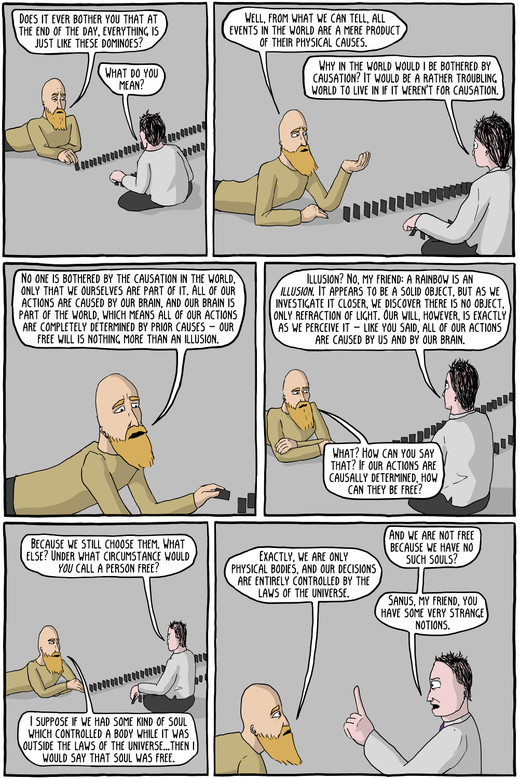My desire for a lapel pin that looked nice but also looked like the anarchy Ⓐ was to be able to start conversations in the least obnoxious way one could start such conversations, like a sort of respectable bumper-sticker. Of course, if I were to ever encounter someone who is even slightly educated with regards to the history of modern political thought or the philosophy of anarchy, the simple red and black Ⓐ may cause some confusion.
Wait, what? Isn't the red Ⓐ the definitive anarchy logo? Haven't you made the case that anarchy is, as a philosophy, incredibly simple and straightforward? It's the rejection of criminal institutions. Simple and straight forward.
It is simple in theory, but humans tend to make things more complicated when putting them into practice. Time for a history lesson. One upon a time, avoidance of coercion, theft, and murder were widely the daily routine. Free exchange of goods and services and people minding their own business was far more common than kings stealing, armies murdering, and sheriffs enforcing, statistically speaking. As social technologies and infrastructures develop and become more efficient, the daily freedom of action diminished due to efficiency in government. After a time, empire collapses and freedom returns. Rinse and repeat.
I am speaking vaguely and mythologically on purpose, as this narrative is cyclical and each cycle consists of generations at a time. In the course of a more recent cycle (circa 19th century AD), a certain philosopher named Pierre-Joseph Proudhon is credited with resurrecting an ancient Greek concept called anarchism. The anarchy he resurrected was, philosophically, in its nascent stages. The Greeks that were prone to mentioning anarchy always did so from the perspective of statism and provided very little development before passing the torch to gnostics and other heretics in the early centuries AD, which did not bode well for the philosophy's development under christian empires. As a philosophy, it is motivated by the same moral principles today as it was at its inception, but a great many more considerations have been provided with regards to the necessary conclusions of those moral principles.
Proudhon's infant anarchy was a radical reaction to imperial statism and institutional violations of human rights. In his fully justifiable fervor to do away with that which is inherently criminal and misanthropic, Proudhon made the mistake of throwing out several ideas that were misrepresented to him and institutions that were not inherently criminal but only incidentally so. Influenced by the popular philosophical zeitgeist of modernism and communism, witnessing the historical relationship between the Church and the state, and the state-like behavior of aristocratic industrialists, Prudhon rejected the ideas of religion and capitalism. This mistake made his particular brand of anarchism indistinguishable from secular communism in practice: a violent revolution of the poor against their oppressors and those who resembled their oppressors in favor of a social justice warrior utopia of violent atheist egalitarianism. The classic punk-rock anarchist Ⓐ is commonly associated with this brand of anarchism, “anarcho-communism” as it is now known.
Fortunately, the philosophy of anarchism has not yet waned. Others have taken up the mantle of anarchism from Proudhon and further refined and developed the philosophy. Most notable of which are likely Spooner, Rothbard, and Mencken. Something all three share in common is the fact that they were all economists. Real economists, not Keynesian socialist bullshit artists... Austrian economists. They were also abolitionists. In the moral pursuit of eradicating the crimes and slavery of the state, they applied their understanding of the human condition, as received from economics, and cleaned up anarchism. They saw the political correctness, feminism, egalitarianism, and socialism embraced by ancoms for what it is: statism.
In response to the red and black ancoms, these second-generation anarchists billed themselves anarcho-capitalists, agorists, voluntarists, and a handful of other names. Being economically minded, these men were more aware of the marketing challenges of advocating freedom in a slave society. Some boldly called themselves anarchists, trying to reclaim the truth; others, justifiably, took the easier and arguably more productive route of adopting wholeheartedly the name, “voluntarist” (or voluntaryist). This, more human-friendly, brand of anarchism took on the yellow and black V of voluntarism to differentiate themselves from its communist progenitor, while still hearkening back to its heritage.
If I am not an ancom or a voluntarist (ancap), what am I? Well, as far as this conversation is concerned, I am an anarchist. I reject all belief in institutions predicated on coercion, theft, or murder. I recognize my responsibility to secure my rights to liberty and property in pursuit of flourishing and acknowledge the same in others. I pursue the abolition of slavery, including the slavery of the state. I believe human interaction is largely voluntary and all agreements and exchanges ought to be voluntary, but that is not a necessary result of anarchism, not the point of origin, nor is it the goal. I believe that, in a state-run society, the truly rich are such at the expense of those who cannot purchase their freedom from the law, but I am not opposed to the legitimate acquisition of material wealth or social influence.
So, the new logo is designed to be identifiable to one with even a basic exposure to anarchy, in either of its popular brands. It is designed to convey that I am either a mixture of both or neither. It is designed to look cool, obviously, and it is designed to resemble a hex or Illuminati doo-dilly because everything is. Most importantly, it is designed to start conversations. As a lapel pin, it can start real conversations, IRL. As a simple logo on a website, it can serve as an identifier for my radical notions and aggressive philosophizing.
Best of all, it can instigate conversations amongst anarchists. We need more discussion amongst ourselves, to try and better understand our own position more deeply. I would love to see Christopher Cantwell, Sloane Frost, and Brian Sovryn go on a retreat together for a weekend. We can all benefit from sharpening our teeth on each other and forging deeper friendships and support structures, as free men are a small minority in today's world. As I pointed out in “Is Anarchy a Bad Word?”, we face a tough marketing challenge against an institution with a mandatory 15,000 hour child indoctrination system; every little bit helps.
Remember, more important that changing people's minds by way of symbols or rhetoric is to simply do what is right and pursue flourishing. Setting the example has always been more productive than arguments or advertising. Without an identifier and an explanation, though, the example set will be too esoteric for others to follow.
Tl;DR: The red and black Ⓐ is typically associated with anarcho-communism. The yellow and black V is typically associated with anarcho-capitalists (aka voluntarists). The new logo, a work in progress, is supposed to be suffix-agnostic, so it's got both logos integrated in one simple design. Please give feedback on the history lesson, the logo itself, or on the idea behind the logo. Also, Please, please, let me know if you would be interested in purchasing a lapel pin at a reasonable price. Manufacturing the pins requires a certain large number be ordered at once, due to the casting model that is used. I can only get my pin if I want hundreds of them or if enough people want to reimburse me for their own pin, thereby reducing the cost to me.






 RSS Feed
RSS Feed
